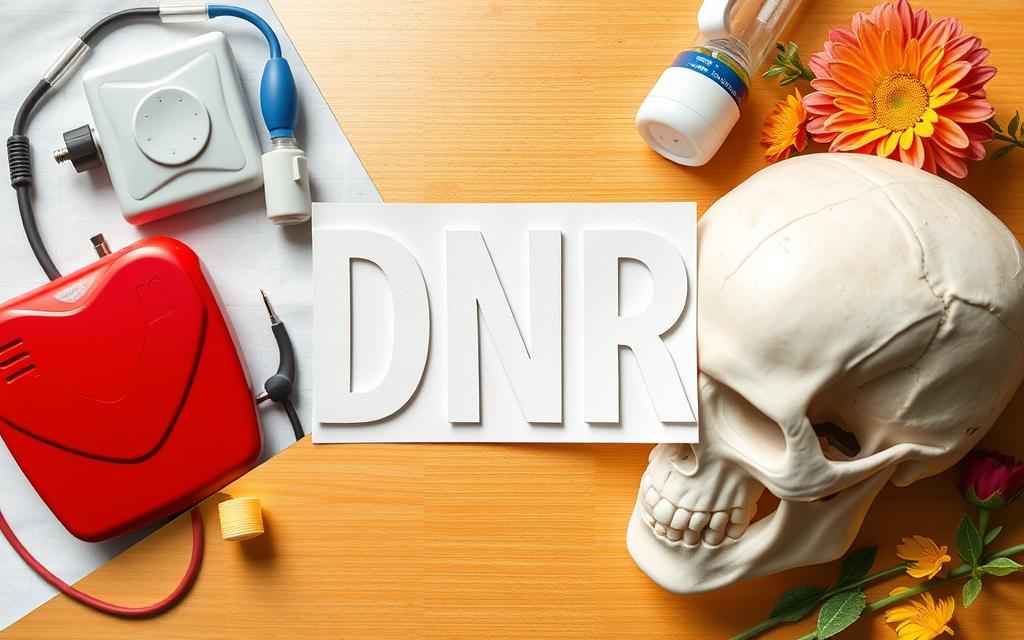I used to work in critical care nursing. A story from my time still sticks with me. It’s about Sarah, who had been fighting a terminal illness for years. When things got worse, she made the tough choice to have a do-not-resuscitate (DNR) order. This decision gave her control and dignity at the end.
Sarah’s story shows why understanding DNR orders is key. These orders let people with serious illnesses or terminal conditions say they don’t want CPR if their heart or breathing stops. Choosing a DNR means avoiding painful procedures like chest compressions and breathing tubes. Instead, they can focus on comfort and a peaceful end.
CPR can save lives, but it’s not always the best choice for everyone with serious illnesses. A DNR order lets patients make a choice that respects their wishes. It’s important for patients, their families, and doctors to know about DNR orders during end-of-life planning.
What is a Do Not Resuscitate (DNR) Order?
A DNR order is a legal document that outlines a person’s choice not to have CPR if their heart or breathing stops. It tells healthcare providers not to perform CPR, including chest compressions, electric shocks, or breathing tubes. This way, the patient’s wishes about their end-of-life care are respected.
This order is crucial for people with terminal illnesses or serious conditions. It lets them decide on the care they want, focusing on their own wishes and comfort. By choosing not to have CPR, they ensure their end-of-life wishes are followed.
Understanding the Purpose of a DNR Order
A DNR order is a key advance directive. It tells healthcare providers what the patient wants regarding CPR and other life-saving actions. This document helps people have a say in their end-of-life care. It also prevents them from getting treatments they don’t want.
| Key Aspects of a DNR Order | Description |
|---|---|
| Advance Directives | A DNR order is a type of advance directive that specifies an individual’s wishes for end-of-life care. |
| Patient Autonomy | A DNR order allows patients to exercise their right to patient autonomy and make informed decisions about their care. |
| Palliative Care | By forgoing CPR, a DNR order often aligns with a focus on palliative care and comfort rather than aggressive, life-prolonging measures. |
What Does Do Not Resuscitate Mean?
“Do not resuscitate” (DNR) is a legal document for people with serious illnesses or conditions. It lets them choose not to get CPR if their heart or breathing stops. This means they won’t get chest compressions, electric shocks, or breathing tubes.
A DNR order helps people control their end-of-life care. It lets them match their treatment with their personal values. This is key in advance care planning, which is about making healthcare wishes known for future crises or terminal diagnoses.
CPR can save lives, but not always for those with severe illnesses. A DNR order lets these patients skip painful and invasive treatments. Instead, they focus on comfort and quality of life at the end.
“A DNR order is a way for patients to have a say in their care and ensure their wishes are respected, even when they can no longer speak for themselves.”
Knowing about DNR orders and end-of-life care helps people make informed healthcare choices. They can share their wishes with family and doctors clearly.
Why Would Someone Choose a DNR Order?
Choosing a Do Not Resuscitate (DNR) order is a personal decision at the end of life. CPR can save lives, but it’s not always the best choice for everyone, especially those with terminal illnesses.
A DNR order means avoiding painful procedures like chest compressions and breathing tubes. It lets patients control their end-of-life care, making choices that match their values.
Prioritizing Quality of Life
For some, CPR might not be worth the risks, especially with serious illnesses. A DNR order lets them focus on comfort care and quality of life at the end. It means avoiding treatments that only prolong life without improving it.
“I want to spend my remaining time with my family, not hooked up to machines. A DNR order gives me the peace of mind to do that.”
Choosing a DNR ensures their end-of-life wishes are followed. It prevents them from facing treatments that are more of a burden than a help.
Maintaining Autonomy and Dignity
A DNR order lets patients make their own healthcare choices. It’s about controlling their health care and respecting their personal preferences at the end of life.
How to Establish a DNR Order

Creating a do-not-resuscitate (DNR) order is key in end-of-life care planning. It lets people with serious illnesses or conditions state their wishes about CPR. By having a DNR order, you can guide the care you get if your heart or breathing stops.
Discussing Your Wishes with Your Healthcare Provider
Talking openly with your healthcare provider is the first step. Share your thoughts on CPR and work with your doctor to record your wishes. They can also help you get a DNR bracelet or card to carry with you.
Informing Loved Ones and Healthcare Proxies
Tell your loved ones and healthcare proxies about your DNR order too. This makes sure your end-of-life wishes are known and respected if you can’t speak for yourself. Many states let you ask for a do-not-resuscitate form from their Health Department. Adding it to a living will or advance directive gives you control over your end-of-life care.
This way, your loved ones can follow your wishes. It’s about keeping your patient autonomy and ensuring your choices are respected, even if you can’t speak up.
“Having a DNR order in place is about maintaining my patient autonomy and making sure my wishes are respected, even if I’m unable to communicate them in the future.”
DNR Orders and Fluid Resuscitation
When it comes to what does do not resuscitate mean, I’ve learned a lot from end-of-life care. A do not resuscitate (DNR) order tells healthcare providers not to do cardiopulmonary resuscitation (CPR). But, it doesn’t mean they can’t do other medical treatments, like fluid resuscitation.
Fluid resuscitation is a way to give fluids and electrolytes to a patient. It’s often used for traumatic injuries or shock. This helps keep vital organs working, even if the heart or breathing stops. So, a DNR order doesn’t stop fluid resuscitation, as it’s a different treatment that can still help the patient.
It’s key for patients, their healthcare proxies, and doctors to talk openly about what a DNR order means. They should discuss if it includes fluid resuscitation or other treatments. This makes sure the patient’s wishes for end-of-life care are followed, in line with their advance directives and living will.
“A DNR order does not mean a ‘do not treat’ order. It simply means the patient does not want CPR if their heart or breathing stops.”
Understanding the details of DNR orders and how they relate to other palliative care treatments is important. This way, patients with terminal illnesses can keep control over their care. They can also make choices based on their own wishes and knowledge.
Making Decisions When Unable to Communicate

Deciding on end-of-life care can be tough when someone can’t speak their mind because of illness or injury. In these situations, a do not resuscitate (DNR) order made before should be followed by healthcare teams.
If there’s no DNR order, a healthcare proxy or a family member can make choices for the patient. But, this can only happen if the patient can’t make decisions on their own. Having an advance directive, like a living will, is key. It makes sure the patient’s wishes for palliative care and end-of-life care are known and respected, even if they can’t speak up.
The main aim is to respect the patient’s autonomy and informed consent as much as possible. By talking openly about their wishes, people can guide their loved ones and doctors. This way, decisions about cardiopulmonary resuscitation and other treatments will match what the patient wants.
Consequences of Resuscitating a DNR Patient
When a patient has a do not resuscitate (DNR) order, healthcare workers must follow it. If they resuscitate someone with a valid DNR order, they could face big legal problems. This is because a DNR is a legal document showing the patient’s choice not to have cardiopulmonary resuscitation (CPR) or other life-saving actions.
But, things get tricky if there’s a mix-up or not knowing about the DNR order. In these cases, the healthcare worker might not be legally blamed. They didn’t know the patient’s wishes. Also, non-medical professionals who give CPR to someone with a DNR order usually won’t face legal trouble. DNR orders only affect healthcare workers.
“Honoring a patient’s DNR order is crucial in upholding their right to self-determination and informed consent at the end of life.”
The outcome of resuscitating a DNR patient can be complex, based on the situation and how well the patient’s wishes were shared. Healthcare workers need to be careful with a patient’s advance directives and palliative care choices. This ensures a respectful and peaceful end for the patient.
Revoking or Changing a DNR Order
In end-of-life care, patients have the right to make their own choices. If you’ve made a do not resuscitate (DNR) order, you can change it if you want. You can ask for CPR if there’s a medical emergency.
To cancel a DNR order, just tell your healthcare provider quickly. They will start the process to cancel it. Make sure to destroy any DNR forms and tell your family and caregivers about the change in your wishes.
You can update or change a living will or healthcare proxy anytime. This lets you choose how you want to handle palliative care and terminal illness. By talking about your wishes, you make sure your advance directives are followed.
“The right to make decisions about one’s own medical treatment is a fundamental part of patient autonomy.”
Choosing how you want to end your life is up to you. By staying informed and speaking up for your wishes, you can control your end-of-life care. This way, you can have peace in your final moments.
Advance Care Planning
Dealing with end-of-life care can feel overwhelming. Yet, talking openly about our wishes, like do not resuscitate (DNR) orders, gives us power. Exploring advance directives and living wills helps us protect our patient autonomy and informed consent. This way, our wishes are known, even if we can’t speak for ourselves.
Talking about cardiopulmonary resuscitation and palliative care with family and doctors is hard. But it’s key to understanding what does do not resuscitate mean and making a solid advance care plan. Thinking deeply about our values and end-of-life wishes brings peace of mind. It ensures our terminal illness wishes are respected, no matter what.
Empowering Patient Autonomy
Advance care planning is all about patient autonomy. By talking and writing down our wishes, we make sure our voices are heard. This gives us and our healthcare proxy peace of mind, especially when making tough decisions.
“Advance care planning is about living well until the end. It’s about having the tough conversations now, so your loved ones don’t have to guess what you would have wanted later.”
This process honors our values and eases the burden on our loved ones in hard times. Advance care planning is a gift to ourselves and those we care about.
Ethical and Legal Considerations
When we talk about do not resuscitate (DNR) orders, things get complex. These orders aim to respect a person’s right to decide how they want to end their life. But, healthcare providers often face tough choices balancing a patient’s wishes with family desires or legal rules.
DNR orders can be tricky because they depend on where you are and the laws there. Sometimes, a patient’s advance directives, like a living will or picking a healthcare proxy, make things clear. But other times, deciding what to do can be hard. Healthcare workers must think about informed consent and the patient’s right to make their own choices.
“The fundamental principle is to respect the patient’s autonomy and follow their expressed wishes. But there can be complex situations where providers need to carefully consider other ethical and legal factors.”
The main aim is to make sure a patient’s wishes, like DNR orders, are respected. At the same time, we must follow the laws and ethical rules of healthcare. It’s important to handle these complex situations with care to give patients the right kind of palliative care when they’re facing the end of their life.
Conclusion
Do-not-resuscitate (DNR) orders give people with serious illnesses or conditions control over their end-of-life care. They decide not to have CPR, avoiding painful and invasive treatments. This way, they can have more control over how they die.
It’s important to talk with doctors and family about DNR orders. Planning ahead helps make sure your wishes are followed. Even though there are legal and ethical issues, DNR orders protect your right to make choices at the end of life.
If you’re thinking about a DNR order for yourself or someone else, talk openly about what does do not resuscitate mean, end-of-life care, and advance directives. Understanding the impact of a DNR ensures your wishes are respected. This way, the end of life is handled with dignity and respect.

